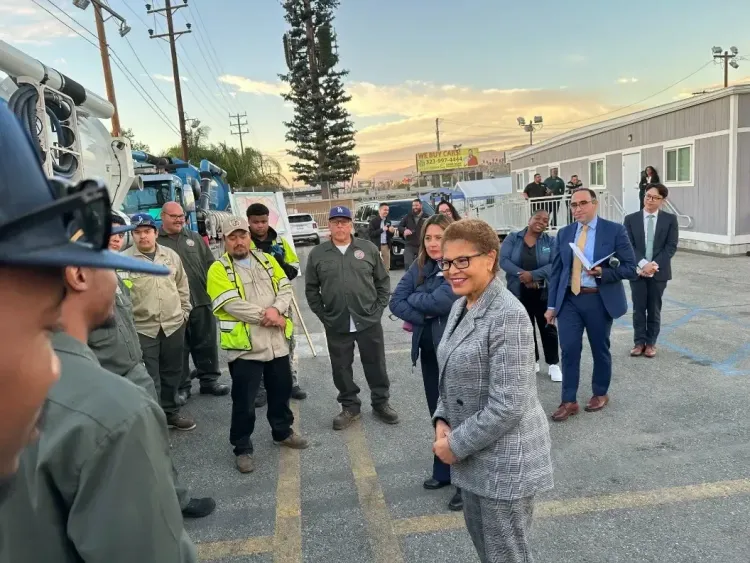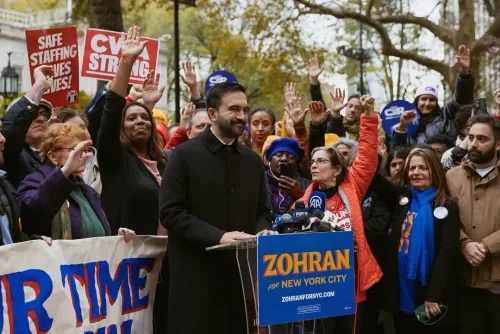Los Angeles Mayor Criticized for Handling of Deadly Wildfires

Los Angeles, Jan 13 (NationPress) As thousands of firefighters are engaged in fighting the fierce wildfires in Los Angeles County, the atmosphere has turned politically charged. A petition initiated by a user named Frustrated Californian on Change.org has amassed over 110,000 signatures demanding the resignation of Mayor Karen Bass.
The petition accuses Bass of severe mismanagement and a lack of leadership during this ongoing crisis.
It particularly highlights Bass’ diplomatic trip to Ghana, which coincided with the outbreak of fires on January 7. The petition also criticizes the city's preparedness and resource allocation, pointing out issues like water shortages and the underfunding of critical resources.
On CNN, Los Angeles Fire Department (LAFD) Chief Kristin Crowley condemned the $17 million budget cut, stating she had warned the city for three years about the department's underfunding and insufficient resources.
In response, Bass asserted that under her leadership, the fire department's budget was actually increased by 7 percent, as reported by Xinhua.
City Administrative Officer Matt Szabo backed Bass’ claims, indicating that emergency resources remained adequately funded despite reductions in other sectors.
The Los Angeles Times mentioned that the criticism towards the Democratic Mayor was somewhat unfair, given that the municipal budget is being stretched by a myriad of demands, including public health, social services, housing challenges, and more, creating a situation of greater need with fewer resources.
To prioritize essential increases in firefighter salaries, Bass initially proposed a 2.7 percent reduction (around $23 million) in the LAFD budget for 2024-2025, mainly by capping certain new equipment purchases.
However, Bass and the City Council later approved substantial pay raises for firefighters, totaling $53 million, and an additional $58 million for new firetrucks and equipment, thereby resulting in an overall budget increase of more than 7 percent for the LAFD.
Despite the overall budget boost, some areas within the department saw cuts, including a $7 million reduction in overtime staffing, affecting critical activities such as radio testing, pilot training, and brush clearance inspections, which are vital for reducing fire risks.
However, rising expenses, including overtime salaries and pension contributions, have placed a strain on the city’s finances. Critics are concerned that while necessary, these pay increases may lead to further operational cutbacks. Watchdog organizations and fire department representatives have warned of an escalating budget dilemma, particularly as emergencies require additional resources.
The ongoing wildfires, especially the Pacific Palisades and Eaton fires, have intensified scrutiny regarding the city’s emergency preparedness.
This unprecedented wildfire situation has exposed weaknesses in the Los Angeles City and County water infrastructure, with firefighting efforts hampered by low water pressure and dry fire hydrants, a result of the unusual demand on hydrants during multiple simultaneous fires.
Martin Adams, a former manager of the Los Angeles Department of Water and Power (DWP), asserted that the local water systems were not built to handle such extensive and atypical wildfire responses, raising questions about what future investments in water infrastructure may be necessary.
Critics have pointed out that at 71 years old, Bass has only been in office for two years; however, they quickly attribute the blame for decades of inadequate investment in fire and water infrastructure to previous administrations, which failed to adapt systems to the increasing risks posed by climate change.
Some local officials are advocating for a commission of inquiry to propose urgent enhancements to water infrastructure and building regulations in fire-prone areas.
In light of the water system failures, California Governor Gavin Newsom has ordered an investigation into the causes of hydrant shortages and gaps in infrastructure.
Experts believe that improving water storage and pressure zones in hillside communities could help mitigate future wildfire risks, although such efforts would demand significant funding. Others contend that even expanded infrastructure might fall short against fires of the current scale and intensity.
“Mother Nature is not to be trifled with,” remarked Los Angeles resident, Cyndy P., to Xinhua on Sunday.
“Let’s not kid ourselves; we are reaching the perfect storm in LA of overbuilding, drought, budget constraints, and infrastructure inadequacies where no amount of money can solve an environment spiraling out of control due to global warming,” she added.









